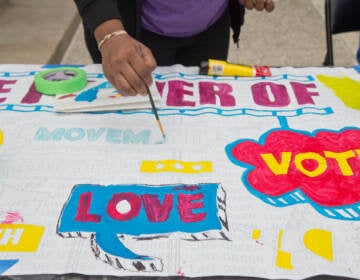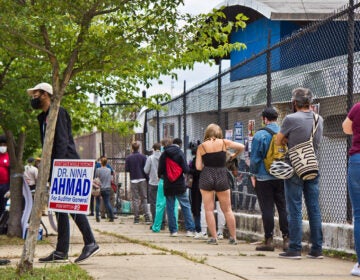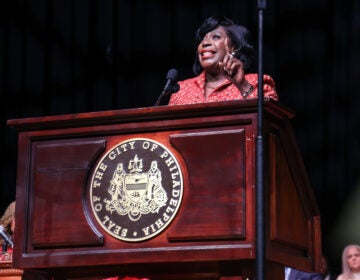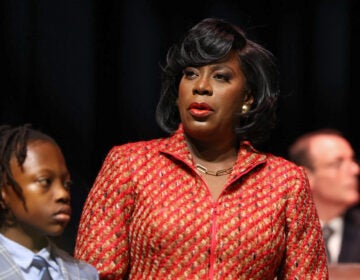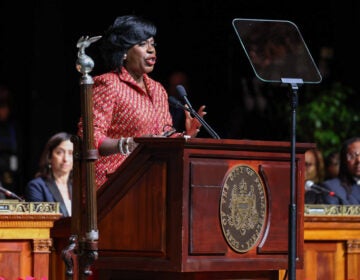Philly mayoral candidates were asked to respond to the arts sector. Only 2 did
"We think that everybody wants to work together," said Jacque Liu, "but they're just not quite sure how."
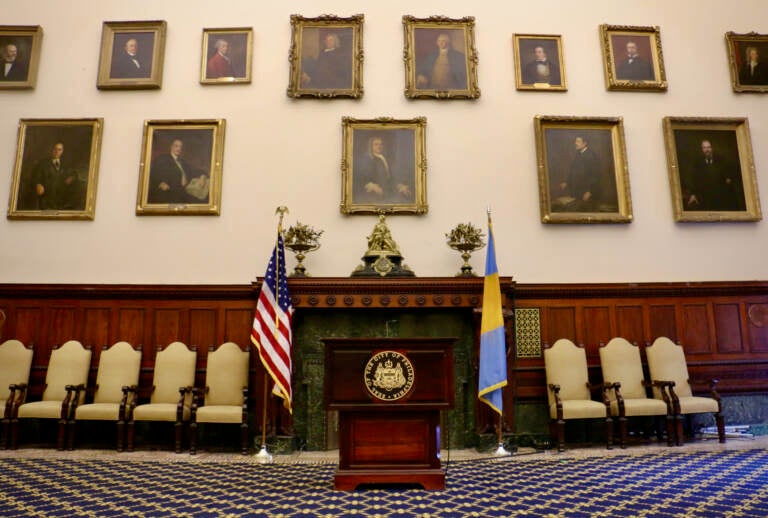
The walls of the Mayor's Reception Room in Philadelphia City Hall are adorned with the portraits of former mayors. (Emma Lee/WHYY)
This story is a part of the Every Voice, Every Vote series.
What questions do you have about the 2023 elections? What major issues do you want candidates to address? Let us know.
After scores of forums in the run-up to the primary to determine the next mayor of Philadelphia, the candidates were asked to respond in writing to questions from the arts community.
Of nine, only Rebecca Rhynhart and James DeLeon replied. Warren Bloom Sr., Amen Brown, Jeff Brown, Allan Domb, Helen Gym, David Oh, and Cherelle Parker did not respond.
“Pitiful, but not surprising,” said Barbara Silzle, former director of the Philadelphia Cultural Fund. “It felt like a confirmation that the sector is not actually worth responding to — the individuals who vote, for God’s sake.”
Silzle has partnered with Jacque Liu, formerly with the city’s Percent for Art Program, and the local art news website theartblog.org to launch Artists for Democracy, an initiative that asked people involved in the arts sector to submit questions for the mayoral candidates, anonymously via an online spreadsheet.
Twenty-nine questions were submitted, and an undetermined number of people upvoted the questions they thought were most important. The editors then boiled those questions down to five, which they gave to the nine candidates for mayor and asked for their responses.
“The questions were pretty granular about a lot of things, asking about the Department of Arts and Culture and the Cultural Fund,” said Roberta Fallon, co-founder of Artblog. “Not every artist knows about those things, but these particular people weighed in on that and they were passionate about it.”
The candidates were given two weeks to respond. All the questions and the complete answers were made public on the Artblog, on Wednesday.
The questions were:
Will you create a Department of Arts and Culture, a cabinet-level position?
Both responding candidates, Rhynhart and DeLeon, said they would. Rhynhart specifically emphasized the future department would “keep a keen eye on small businesses, especially BIPOC and women-led.”
How will you choose a leader of this department?
DeLeon wrote back saying his leader would appreciate the importance of equity, diversity, and inclusion. Rhynhart said her ideal candidate would have first-hand experience in the arts sector.
How would you support the Philadelphia Culture Fund?
DeLeon said he would keep the PCF funded with $3.5 million annually, the amount allotted in the city budget approved last summer. But in December, an unexpected mid-year transfer boosted the fund to $5.5 million. Rhynhart said she would consult with the PCF on what its needs are.
Do you have any new initiatives to support arts in the city?
DeLeon explained his idea for an Art Train, a workforce training and skill-sharing program for the arts sector. Rhynhart was less specific, explaining she would “weave” the new Department of Arts into the programs of other departments in her administration, using the model of Mural Arts Philadelphia.
Will the new Department of Arts and Culture have direct representation from people in the city’s arts sector?
Both DeLeon and Rynhart said it would.
Many of these questions were raised in the two mayoral forums that focused on the arts. This format gave the candidates a chance to reveal more depth to their answers, than the soundbite-oriented answers they gave in the fast-paced setting of a forum.
“There is one thing that I thought was pretty disappointing, was this constant repeating of the artist’s contribution to the creative economy, and this notion that artists’ value only comes from how we can generate revenue,” said Liu. “If we’re in business: Sure. But we’re not in business. We’re in civic and community development.”
An effort like this, to have mayoral candidates respond directly to questions from people who work in the arts, is rarely if ever done. Silzle said there is an urgency in this election cycle for something like Artists in Democracy, citing the devastating effect of the pandemic, the attempt to zero out the Culture Fund by the current administration, and the loss of several arts-friendly council members who left their seats to run for mayor.
“We don’t have those people on Council who have a history of understanding the funding for the arts and PCF,” said Silzle. “It feels like there’s so much change that we really wanted to activate the arts community, and individual artists specifically, in this project.”
Silzle noted that of the four former council members who quit to run for mayor, none responded to the questionnaire.
The posting of the final questions and their answers is the end product of Artists for Democracy. At least for now. The partners don’t know if their work will tip any scales in the upcoming election, but Liu believes it lays the groundwork for how City Hall and the arts community might be able to work together to address civic concerns like gun violence, public safety, drugs, and education.
“We saw a possibility to get artists involved, and also to get mayoral candidates involved,” Liu said. “We think that everybody wants to work together, but they’re just not quite sure how. We’re trying to illuminate a path.”
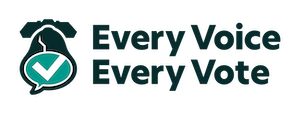 This story is a part of Every Voice, Every Vote, a collaborative project managed by The Lenfest Institute for Journalism. Lead support is provided by the William Penn Foundation with additional funding from The Lenfest Institute, Peter and Judy Leone, the John S. and James L. Knight Foundation, Harriet and Larry Weiss, and the Wyncote Foundation, among others. Learn more about the project and view a full list of supporters here.
This story is a part of Every Voice, Every Vote, a collaborative project managed by The Lenfest Institute for Journalism. Lead support is provided by the William Penn Foundation with additional funding from The Lenfest Institute, Peter and Judy Leone, the John S. and James L. Knight Foundation, Harriet and Larry Weiss, and the Wyncote Foundation, among others. Learn more about the project and view a full list of supporters here.
WHYY is your source for fact-based, in-depth journalism and information. As a nonprofit organization, we rely on financial support from readers like you. Please give today.



